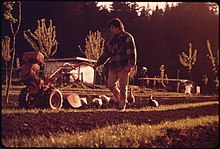History of organic farming
For example, forest gardening, a fully organic food production system which dates from prehistoric times, is thought to be the world's oldest and most resilient agroecosystem.
The history of this modern revival of organic farming dates back to the first half of the 20th century at a time when there was a growing reliance on these new synthetic, non-organic methods.
The introduction of the gasoline-powered internal combustion engine ushered in the era of the tractor and made possible hundreds of mechanized farm implements.
Their research and further development of these methods is recorded in his writings, notably, his 1940 book, An Agricultural Testament, which influenced many scientists and farmers of the day.
King foresaw a "world movement for the introduction of new and improved methods"[9] of agriculture and in later years his book became an important organic reference.
The term "organic farming" was coined by Walter James (Lord Northbourne), a student of Biodynamic Agriculture, in his book Look to the Land (written in 1939, published 1940).
[11] In 1939 James, Albert Howard, Ehrenfried Pfeiffer and George Stapleton joined at Farleigh to implement an experiment comparing Biodynamic, organic and chemical fertilization methods.
The experiment was cut short due to the fact that Biodynamic compost was not available until after the Betteshanger Summer School event, the disruption of the impending war, and lack of funding.
Lady Balfour believed that mankind's health and future depended on how the soil was used, and that non-intensive farming could produce more wholesome food.
In Japan, Masanobu Fukuoka, a microbiologist working in soil science and plant pathology, began to doubt the modern agricultural movement.
At the same time, increasingly powerful and sophisticated farm machinery allowed a single farmer to work larger areas of land and fields grew bigger.
One of the reasons for this, which informed and guided the ongoing Green Revolution, was the widespread belief that high global population growth, which was demonstrably occurring, would soon create worldwide food shortages unless humankind could rescue itself through ever higher agricultural technology.
In 1962, Rachel Carson, a prominent scientist and naturalist, published Silent Spring, chronicling the effects of DDT and other pesticides on the environment.
His approach to small-scale grain production emphasized a meticulous balance of the local farming ecosystem, and a minimum of human interference and labour.
Since the early 1990s, the retail market for organic farming in developed economies has been growing by about 20% annually due to increasing consumer demand.
